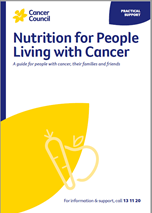- Home
- About Cancer
- Living well
- Nutrition and cancer
- Treatment side effects and nutrition
- Constipation
Constipation
Constipation is when your bowel movements (faeces, stools or poo) are hard and difficult to pass. It can be caused by different factors including: some chemotherapy and anti-nausea drugs; strong pain medicines (opioids); eating less fibre; not moving around as much; not drinking enough (dehydration); or not eating enough.
If you have severe constipation with symptoms such as abdominal (tummy) pain and swelling, nausea and vomiting, this may be sign of a blockage in the bowel (bowel obstruction). This needs urgent medical attention.
How to manage constipation
- Drink 8–10 glasses of fluid a day (e.g. water, herbal tea, milk-based drinks, soup, prune juice) to soften faeces.
- Eat foods high in insoluble fibre (e.g. wholegrain breads, cereals or pasta; raw and unpeeled fruits and vegetables; nuts and seeds; legumes and pulses).
- If you add foods with more insoluble fibre to your diet, drink more fluids to avoid the extra fibre making constipation worse.
- Ask your doctor about using a laxative, stool softener and/or fibre supplement.
- Plan to do some physical activity every day. Ask your doctor, exercise physiologist or physiotherapist about the amount and type of exercise that is right for you.
- Visit your doctor if you see blood in your faeces. They’ll check for haemorrhoids or any other issues.
- If you have had surgery for bowel cancer and have a stoma ask your health care team for specific dietary advice. They may suggest eating more low-fibre foods avoid constipation.
→ READ MORE: Managing diarrhoea
Podcast for people affected by cancer
Listen now
Jacqueline Baker, Senior Oncology Dietitian, Chris O’Brien Lifehouse, NSW; Lauren Atkins, Advanced Accredited Practising Dietitian, OnCore Nutrition, VIC; Dr Tsien Fua, Head and Neck Radiation Oncology Specialist, Peter MacCallum Cancer Centre, VIC; Rosemerry Hodgkin, 13 11 20 Consultant, Cancer Council WA; Clare Hughes, Manager, Nutrition Unit, Cancer Council NSW; John Spurr, Consumer; Emma Vale, Senior Dietitian, GenesisCare, SA; David Wood, Consumer.
View the Cancer Council NSW editorial policy.
View all publications or call 13 11 20 for free printed copies.
Need to talk?
Support services
Exercise and cancer
Exercise has many benefits both during and after cancer treatment, helping with side effects, speeding up recovery, and improving quality of life
Looking for transport, accommodation or home help?
Practical advice and support during and after treatment
Cancer information
Relaxation and meditation
Learn how relaxation and meditation can help you both during and after cancer treatment, or listen to our relaxation and meditation podcast
Cancer treatment
Learn about the different treatments that are used to treat cancer, such as surgery, chemotherapy, radiation therapy and targeted therapy
